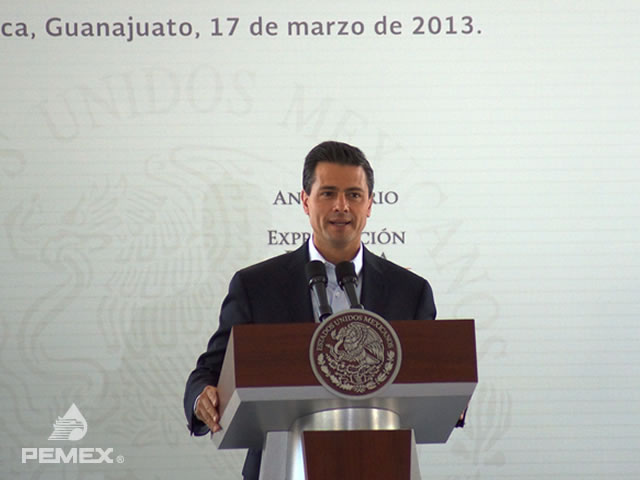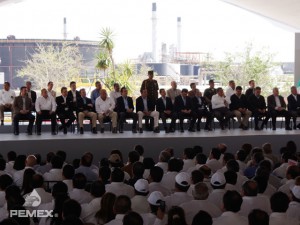October 2013, Vol. 240 No. 10
Features
Energy Reforms Would Open Mexicos Petroleum Industry To Global Investment

In a bid to fulfill a campaign promise, Mexican President Enrique Peña Nieto has proposed a change to the constitution to allow private companies to share in the development, transportation and refining of Mexico’s vast energy resources, which are reserved exclusively to Petróleos Mexicanos (PEMEX). The changes would revert the constitution to its 1940 position, maintaining national ownership of all hydrocarbons but overturning 1950s-era changes that prevent any private interest participating in the energy industry.
A Clean Slate
If passed, the constitutional changes would create the legal foundation for a further set of laws outlining conditions for private participation in the industry. Constitutional reform requires a two-thirds majority in both houses of Congress and ratification from half of Mexico’s states, but with the current political situation the amendment is expected to pass before the end of 2013.
“In essence, when you look at the specific proposal, all it does is clean the slate of the constitutional element for the Congress to legislate who can do what and under what terms and conditions,” said Jose Valera, partner in Mayer Brown’s global energy practice.
The follow-on legislation to set the terms of private investment will likely be more contentious, but the coalition lined up behind reform and the potential reward of passing it inspires optimism in many observers.
Mexico had an estimated 10 billion barrels of proven oil reserves in 2011 and further discoveries are likely in deepwater and shale formations. EIA figures estimate Mexican shale gas reserves alone at 681 Tcf and cite 17.3 Tcf of proven reserves as of 2011; in 2012 it produced only 5.2 Bcf/d of natural gas and imported another 1.6 Bcf/d via pipeline from the United States and its two LNG import terminals.
“Mexico has the advantage of being, in terms of the world scene, a fairly developed economy. It’s a partner to NAFTA already, it’s one of the most sophisticated economies in all of Latin America, it has a proximity to the U.S., it has a thriving oil and gas sector now, and the geology of the Gulf of Mexico as it extends into Mexico is not greatly different than the geology of the Gulf of Mexico and the Texas border,” said Dallas Parker, head of Mayer Brown LLP’s global oil and gas practice.

That adds up to an investment opportunity worth “billions, no question,” Parker said. “This is not like taking this expertise to Mozambique or Tanzania or other places where we’ve seen very significant investments in short periods of time. I think the numbers are going to be quite large and I think it’ll happen pretty fast.”
Pipeline Deficits
Although much of the coverage of the reforms has focused on the E&P side, Mexico’s pipeline industry is included in the list of arenas the reforms propose to open, with the need for additional infrastructure clear. “Mexico only has about 6,000 miles of gas pipelines,” said Valera. “It could use three times that.” Peña Nieto called out the inefficiency of the crude oil transport network specifically in announcing the reforms, noting that shipping from production facilities to refineries is often accomplished by trucks at a premium cost. Valera named liquids and pipelines to transport them as another area where reform would remake the business climate completely.
The hunger for natural gas for power generation recently led to limited reforms allowing natural gas transmission pipelines to be built by private companies, said Valera, but distribution systems are mostly underdeveloped.
Sempra International, which owns 436 miles of pipelines in Mexico, won a bid to build another 510 miles of transmission lines on the west coast in late 2012, and received the first license to build a privately owned LDC in 1997, released a statement lauding the reform attempt. “We view any energy reforms that encourage private investment in the energy sector as a positive step forward. Mexico requires more infrastructure in order to meet the country’s growing demand for energy.”
The network is expanding, but so is need. Sempra International representative Paty Ortega Mitchell explained, “Natural gas demand is growing more than 3% per year primarily for power generation and industrial use. There are more than 3,000 km [1,875 miles] of natural gas pipelines in Mexico in development and construction that will go into service from 2013 through 2016.“
History And Politics
Although energy reform has been a goal of Mexico’s last three presidents, popular resistance and interparty dynamics have blocked the way until now.
The current situation came into being in two main thrusts, the first an amendment to the constitution proposed in 1938, in which President Lázaro Cárdenas nationalized the country’s oil and gas resources in a move still celebrated in a state holiday. In the 1950s, the constitution was amended to forbid “concessions” to private companies. An attempt at energy reform under PAN governance in 2008 legalized service agreements but failed to go further.
“The nationalization of the industry is a source of great pride in Mexico, that the people re-established ownership over their own natural resources. That was really a different era, a different world. That idea, though, has been so deeply ingrained into the Mexican psyche and culture that it’s been very difficult to overcome even though the world around has changed quite a bit,” Parker said.
The current President Peña Nieto has invoked history and national pride as well as practical concerns in his campaigning for the reforms, focusing on the return to Cárdenas’s policy. “Going back to Lázaro Cárdenas, [Peña Nieto] says he’s our oil pope and I’m going to be as Catholic as he is on this,” Valera said.
All three main Mexican political parties agree that the country’s energy laws need to be changed. The powerful PEMEX union (representing 151,000 employees) has stayed out of the discussion.
A third of Mexico’s total revenue comes from PEMEX, which holds a unique position in the world’s energy industry. “We talk about PEMEX the national oil company, but really it’s not even a company. It’s a decentralized agency of the state,“ said Dr. Duncan Wood, director of the Mexico Institute at the Woodrow Wilson international Center for Scholars.
Now that the shallow-water oil that PEMEX has specialized in for decades is mostly played out, it is facing twin pressures of a need to generate revenue to fund the Mexican government and a lack of technology and expertise in exploiting the difficult-to-produce areas where known reserves remain.
“Whereas oil companies around the world, including national oil companies, have been able to modernize themselves to face the challenge, PEMEX itself has not been able to because it’s been held back by the constitutional restrictions and by the politics of Mexico that prevent it from entering into any kind of alliance with the private sector,” he said.
Because PEMEX has a monopoly on all areas of energy exploitation in Mexico and by law cannot form partnerships, its lack of technology and know-how to develop any aspect of hydrocarbon value chain means that what it can’t do simply does not get done.
The exact structure of the reforms will be determined by the secondary legislation once the constitutional amendment is passed, leaving open questions of what share companies would take in resources produced or infrastructure built, whether national content guidelines would be implemented to build up oilfield industries, and what taxation and royalty agreements would look like.
Congress and Peña Nieto are also discussing financial and tax reform legislation, but separately from the energy effort and among a large number of other initiatives. Regulations, methods for determining which companies may enter the market, and the conditions of any partnership have yet to even be outlined, and the specifics may reveal deeper divisions between the parties to strain the cooperative progress.
The potential rewards the reforms offer, however, are large both in immediate financial terms and in terms of long-term economic development, Parker said. “I think they can be transformational to Mexico and the Mexican people, and the development of the middle class there. The development and progress in Colombia and Brazil compared to the declining reserves in Mexico is quite a stark contrast, and with the communication abilities around the world today I don’t think any of that is being lost on the Mexican population.
“The world has changed and they can see the prosperity that opening the oil and gas sectors has brought to Colombia and Brazil, and that the system that served them well for many years after 1938 is not achieving the goals that the Mexican people desire and deserve,” he said.





Comments